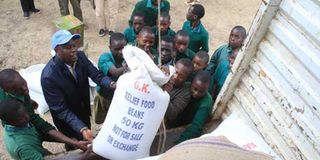Over 24,000 need relief food as drought hits parts of Nyeri

Kieni MP Kanini Kega helps offload relief food at Karicheni Primary School in Nyeri. Over 24,000 people in various parts of the county require relief food following a persistent drought. PHOTO | JOSEPH KANYI | NATION MEDIA GROUP
What you need to know:
- Mr Thuo said the number is likely to rise following reduced rains during the current season.
- The short rains which started on the fourth week of October 2016 were erratic and short-lived.
- While most food stuffs were available in the market, prices rose sharply making them unaffordable for most people.
- Mr Thuo said they require 16,164 bags of maize, 6,062 bags of beans and 4,042 cartons of cooking fat.
About 24,000 people in Nyeri County are in dire need of relief food following prolonged drought, according to the county executive for Agriculture Robert Thuo.
Mr Thuo said the number is likely to rise following reduced rains during the current season.
“The short rains were not only extremely depressed but were poorly distributed both in time and space,” he said.
He added that there was a decline in the amount of rainfall and the number of wet days recorded at the weather station in Wambugu farm.
In 2016, the county received rain for 82 days, recording 782.4mm of rainfall compared to 91 days of rain and 854.2mm of rainfall in 2015.
Kieni Constituency is usually the most affected part of Nyeri despite being the food basket of the county.
The short rains which started on the fourth week of October 2016 were erratic and short-lived.
While most food stuffs were available in the market, prices rose sharply making them unaffordable for most people.
Mr Thuo said people in three sub-counties of Nyeri Central, Kieni East and Kieni West will require relief food for the next six months.
He said they require 16,164 bags of maize, 6,062 bags of beans and 4,042 cartons of cooking fat.
“Those affected [are] mainly the most vulnerable in the society including the aged, physically challenged and the people living in slums. These people do not have land to till for food production,” said Mr Thuo.





